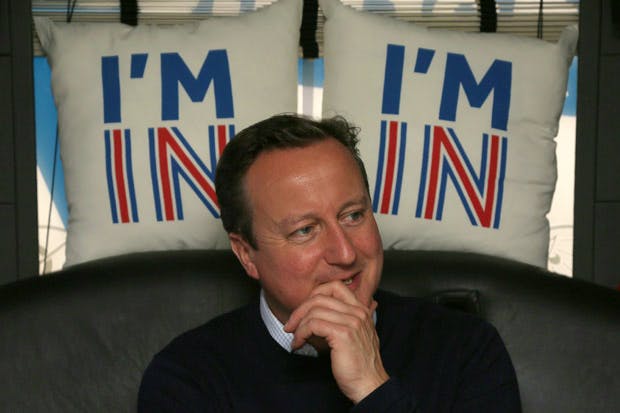David Cameron bet everything on winning this European Union referendum. He lost. His resignation was inevitable, but the timing was not. Indeed, scores of pro-Brexit Tory MPs had signed a letter asking him to stay as Prime Minister – or, at the very least, not walk out of No.10 on the morning after the vote. Yes, he would not be the best person to lead Brexit talks – but these talks could be several months, perhaps years away. So there was no reason to rush for the exit and plenty reason not to do so. Brexit vote was always going to create uncertainty in the financial markets. Adding political uncertainty, in the form of a Prime Ministerial resignation, was never going to help.
Furthermore, Cameron owes his position to the fact that Michael Howard stayed on for a decent length of time after the 2005 general election. This gave his party time to compose itself, and gave an unexpected candidate time to emerge. This is now far less likely to happen on the timescale that he set out this morning. Labour owes its position, in no small part, to Ed Miliband’s refusal to stay and give party the same time to gather strength, and give candidates the time to build up confidence. Cameron’s last duty to his party ought to have been staying longer, and providing the stability that Howard provided for him. But he felt this referendum was a personal rejection, as well as political one. It is a bad end to an reamarkably good premiership.
It is hard, now, to think that just over a year ago he won an extraordinary general election victory — saving us from Ed Miliband, whose government would have been more damaging for Britain than anything that could come out of Brussels. If it were not for Cameron’s campaign, there would have been no referendum.
Go back to his inspiring Bloomberg speech of January 2013 and it is easy to see why he took the course of action that he did. His strategy of holding a renegotiation of Britain’s terms of membership with the EU, followed by an in-out referendum, was logical. It not only bought him time, but also offered both pro-Europeans and Eurosceptics an opportunity to put forward positive ideas of what a reformed EU might look like, while moderating the electoral threat from Ukip and isolating Ed Miliband as the only leader distrustful of democracy. Even the Greens supported his referendum.
The fault with Cameron’s strategy is that it was based on a false premise: that the EU is open to reform. It is not and never will be. The louder the voices for reform, the more its unelected leaders retreat into their siege positions. The threat of a British referendum was supposed to jolt them into the realisation that their dream of a pan-European pseudo-state is less and less shared by the public. But instead of sending scouts to hear what the people wanted, they stayed up on the ramparts and boiled the oil ready to pour on the mob.
The Prime Minister ought not to have settled for the pitiful renegotiation deal. Several times he presented to his fellow European leaders opinion polls showing that support for the EU rose significantly if Brits thought the EU was responsive; that it was listening. He had just fought a general election on a manifesto with two specific pledges: he wanted to stop child benefits paid in respect of people living overseas. And he wanted to stop immigrants claiming welfare until they had been in Britain for four years.
Neither demand was massive, perhaps neither would have had much of an impact. But they were totemic: in Britain, a manifesto pledge carries a certain weight. A great many Brits wanted to know: was the EU listening? Was it capable of reform? The renegotiation showed that it was not. The Prime Minister then gambled on carrying on regardless, trying to make this a debate about openness and internationalism – rather than the merits of the EU. Voters, in the end, wanted to make the referendum about the EU.
It is ironic that Cameron’s biggest single problem in the EU campaign – his inability to reduce net immigration to the order of tens of thousands a year – is problem of the economic success that has been achieved. Would we rather live in a country where migrants were camping out in Dover, risking their lives to get to Calais? Or where immigration wasn’t a headache, because everyone knew that the prospects in Britain were so grim? Several deep problems have been exposed by this campaign, as James Bartholomew sets out in his article this week. But we’re better off today because of the welfare reforms that David Cameron has overseen, and the education reform that he asked Michael Gove to carry out.
This is how Cameron should be judged: on the results of his premiership, rather than the awful referendum campaign. Employment and disposable income are at record highs. The financial markets are in turmoil, but Britain is in a decent place to be able to deal with that: inflation is on the floor, so it can afford to rise. Crime is at its lowest level for 25 years. Thousands of schools have been freed from local authority control. Welfare has been reformed to make work pay. Inequality has been falling. This is David Cameron’s legacy to Britain.
Got something to add? Join the discussion and comment below.
Get 10 issues for just $10
Subscribe to The Spectator Australia today for the next 10 magazine issues, plus full online access, for just $10.














Comments
Don't miss out
Join the conversation with other Spectator Australia readers. Subscribe to leave a comment.
SUBSCRIBEAlready a subscriber? Log in